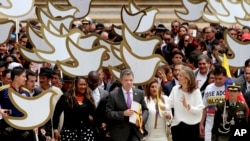FARC rebel commanders in Colombia ordered a final cease-fire beginning at the start of Monday as part of a permanent peace deal with the government ending one of the world's longest-running conflicts.
"Never again will parents be burying their sons and daughters killed in the war," the rebel leader known as Timoshenko said. "All rivalries and grudges will remain in the past."
The two sides have been negotiating for the past four years in Havana, Cuba. The peace deal was reached this past week and finally ending 52 years of fighting between the Marxist rebel group and various Colombian governments.
"To the soldiers, the marines, the pilots of the Air Force, police and security and intelligence organizations of the state, we want to demonstrate our clear and definite intent for reconciliation. The rivalries and rancor should be left in the past," Timoshenko said.
Colombian President Juan Manuel Santos said the military will also lay down its arms against the rebels beginning Monday.
The fate of the peace agreement will then be in the voters’ hands. The government's accord with FARC - the Revolutionary Armed Forces of Colombia - still must be ratified in a referendum scheduled for October 2.
Top FARC commanders are planning to meet one last time in September to ratify the accord.
Guerrillas must turn over their weapons within six months after the agreement is formally signed. In exchange, FARC members will join the legal political process. Ten congressional seats - five in the Senate and five in the lower house - will be available for FARC delegates.
Also in the lower house, 16 grassroots seats will be created to bring attention to rural areas believed to be neglected by the state, reports say. Existing political parties will be banned from running candidates in these areas.
In 2026, both agreements are set to end and FARC delegates must engage in the political process through the ballot box.
What began as a small peasant uprising in 1964 grew into one of Latin America's longest and bloodiest conflicts, leaving more than 220,000 people dead and driving more than 5 million people from their homes.
Opponents of President Santos and some human rights groups have criticized a key part of the deal that says guerrillas who confess their crimes won't spend any time in prison and will instead be allowed to serve out reduced sentences of no more than eight years by helping rebuild communities hit by the conflict.
The rebel army was forced to the negotiating table after a decade of heavy battlefield losses that saw a succession of top rebel commanders killed by the U.S.-backed military and its ranks thinned by half to the current 7,000 fighters.
Although polls indicate Colombians dislike the rebel group, analysts expect the pact to be approved easily.
"The war has ended. We live together as brothers and sisters," Timoshenko said.










